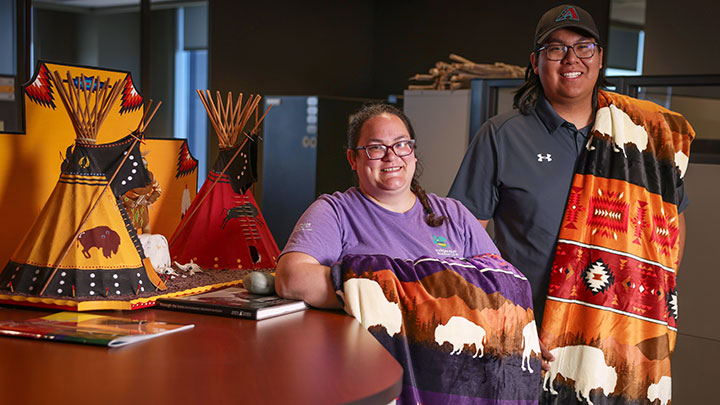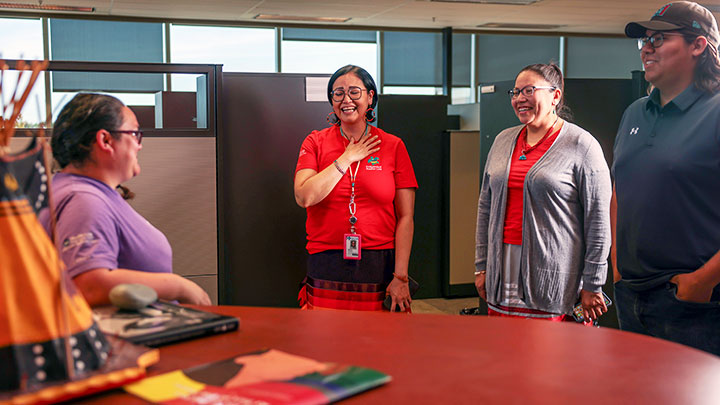
June 2, 2025

Indigenous Support Line listener Shantelle Malley, left, and caller Colby Meguinis show off their blankets gifted to them when they met for the first time, face to face. The pair developed a phone relationship after Colby called the line for assistance navigating the health system. The Indigenous Support Line is now available provincewide to assist Indigenous patients and families with their healthcare concerns and questions. Photo by Leah Hennel.

Billie-Jo Onespot, second from left, a senior practice consultant with the Indigenous Support Line, is overcome with laughter as she introduces callers Janil and Colby Meguinis, at right, to listener Shantelle Malley for the first time. Shantelle and Colby developed a close relationship over the phone when Colby called to get help navigating the health system. Photo by Leah Hennel.
Story by Kim Bradley | Photos by Leah Hennel
Shantelle Malley speaks with dozens of Indigenous patients in her role as an Indigenous listener with the Indigenous Support Line, but she never gets to put a face to the voice. This changed recently when one caller kindly accepted an invitation to visit the call centre to meet Malley and her colleagues.
Colby Meguinis, 24, of the Tsuut'ina First Nation, and his mom Janil, both lit up when they met face-to-face the petite listener who helped Colby navigate and fine the health support he needed on a recent call. The family wanted to visit to express their gratitude — and to celebrate the expansion of the Indigenous Support Line to Calgary and Edmonton.
“It feels pretty good knowing that if I ever have kids, or my siblings or my cousins need help with Indigenous problems, that we have a support line now to go to and feel comfortable with,” says Colby. “It’s more comfortable to talk to an Indigenous person who understands Indigenous problems.”
Colby, an athletic hockey player, needed an ultrasound. But when he went to his appointment, he was told there would be a cost to him because he didn’t have an Alberta Health Care number and wasn’t in the system. He had no idea that, when he turned 22, he needed to apply for his own number. He didn’t know how to get one.
During his efforts to get a new number, at one point he was told he “didn’t exist” by someone who lacked knowledge of First Nations, bands, Indian Affairs and how these processes can differ for Indigenous peoples.
Billie-Jo Onespot, a senior practice consultant with the Indigenous Support Line who knows the Meguinis family from her community, suggested to Colby’s Mom that he call the Indigenous Support Line. She relayed that information to her son and he was able to get the help he needed.
“As a mom, I want to do everything for him, but at the same time, I need him to learn. So I gave him the number, he called, he explained, and now he's back to being Colby,” says Janil.
“I really think it helps being able to speak to someone who understands where we're coming from — and who we are as people.”
The Indigenous Support Line — operated by Health Link through Primary Care Alberta in partnership with the Indigenous Wellness Core — has been rolling out across the province, zone by zone, for three years.
The line expanded to the entire province on June 1 which will benefit more Indigenous individuals in Alberta. It is staffed 10 a.m. to 6 p.m. Monday through Friday by clinically trained Indigenous listeners who assist with many elements of the healthcare system including wayfinding, translation and transportation services, cultural support services, and access to ceremony. Listeners also advise front-line healthcare workers on how to provide culturally safe care.
Onespot is proud the line will now be provincewide, growing the team’s outreach to help more Indigenous people get the care they need.
“I’m just so proud of our team. Our listeners do an amazing job,” she says. “It's just very rewarding and amazing to see that our people are now feeling safe to seek healthcare — and it's equitable healthcare — throughout the province.”
The first of its kind in Canada, the Indigenous Support Line has won many patient quality and experience awards and has received 97per-cent patient satisfaction survey results.
But it is rare that these Indigenous listeners get the opportunity to meet their patients face-to-face. That’s why Malley was so excited to meet Colby in person because of the relationship they developed over the phone.
“Seeing him today was just amazing,” she says. “We know in healthcare, there's a lot of trauma there. So being somebody who can just listen, it provides a space for them to feel heard.
Malley says she enjoys her job of “helping to rebuild trust in the healthcare system, one call at a time” through the Indigenous Support Line.
We have a shared understanding, and I think that helps build that relationship, because they know they're talking to somebody who does know the past, who does know the history,” she says. “It makes me feel good, because I know that our line is working. I know that what we're doing is helping our people.”
To access the line, call 1-844-944-4744 or 811. For more information, visit our AHS website.